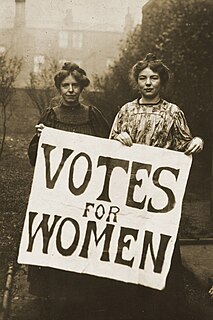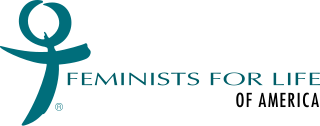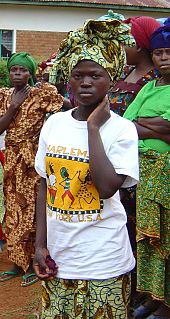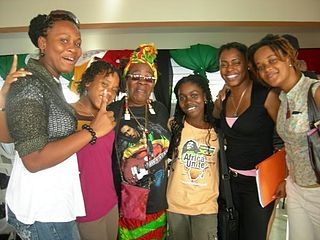Related Research Articles

Women's rights are the rights and entitlements claimed for women and girls worldwide. They formed the basis for the women's rights movement in the 19th century and the feminist movements during the 20th and 21st centuries. In some countries, these rights are institutionalized or supported by law, local custom, and behavior, whereas in others, they are ignored and suppressed. They differ from broader notions of human rights through claims of an inherent historical and traditional bias against the exercise of rights by women and girls, in favor of men and boys.
Reproductive rights are legal rights and freedoms relating to reproduction and reproductive health that vary amongst countries around the world. The World Health Organization defines reproductive rights as follows:
Reproductive rights rest on the recognition of the basic right of all couples and individuals to decide freely and responsibly the number, spacing and timing of their children and to have the information and means to do so, and the right to attain the highest standard of sexual and reproductive health. They also include the right of all to make decisions concerning reproduction free of discrimination, coercion and violence.

Gender equality, also known as sexual equality or equality of the sexes, is the state of equal ease of access to resources and opportunities regardless of gender, including economic participation and decision-making; and the state of valuing different behaviors, aspirations and needs equally, regardless of gender.

Feminists for Life of America (FFL) is a non-profit, anti-abortion feminist, non-governmental organization (NGO). Established in 1972, and now based in Alexandria, Virginia, the organization describes itself as "shaped by the core feminist values of justice, non-discrimination, and non-violence". FFL publishes a biannual magazine, The American Feminist, and aims to reach young women, college students in particular.
Equality Now is a non-governmental organization founded in 1992 to advocate for the protection and promotion of the human rights of women and girls. Through a combination of regional partnerships, community mobilization and legal advocacy the organization works to encourage governments to adopt, improve and enforce laws that protect and promote women and girls' rights around the world.

The National Organization for Women (NOW) is an American feminist organization founded in 1966. The organization consists of 550 chapters in all 50 U.S. states and in Washington, D.C. It is the largest feminist organization in the United States with around 500,000 members. NOW is regarded as one of the main liberal feminist organizations in the US, and primarily lobbies for gender equality within the existing political system.
Timeline of women's legal rights represents formal changes and reforms regarding women's rights. The changes include actual law reforms as well as other formal changes, such as reforms through new interpretations of laws by precedents. For such things only in the United States, see Timeline of women's legal rights in the United States. The right to vote is exempted from the timeline: for that right, see Timeline of women's suffrage. The timeline excludes ideological changes and events within feminism and antifeminism: for that, see Timeline of feminism.

Women in the Democratic Republic of the Congo have not attained a position of full equality with men, with their struggle continuing to this day. Although the Mobutu regime paid lip service to the important role of women in society, and although women enjoy some legal rights, custom and legal constraints still limit their opportunities.
The Ohio Legislative Black Caucus (OLBC), formally known as the Black Elected Democrats of Ohio, is an American political organization now composed of African Americans elected to the Ohio General Assembly. The Ohio Legislative Black Caucus is the oldest legislative black caucus in the nation.

Nancy Schwartzman is an American director, producer and media strategist.
The Feminist Majority Foundation (FMF) is a non-profit organization headquartered in Arlington County, Virginia, whose stated mission is to advance non-violence and women's power, equality, and economic development. The name Feminist Majority comes from a 1986 Newsweek/Gallup public opinion poll in which 56 percent of American women self-identified as feminists. President and one of the founders, Eleanor Smeal, chose the name to reflect the results of the poll, implying that the majority of women are feminists.

Frank LaRose is an American politician. He is Ohio's secretary of state after serving two terms as a Republican member of the Ohio State Senate from Ohio's 27th Senate district which includes Wayne County as well as portions of Stark and Summit counties.
War on women is a slogan in United States politics used to describe certain Republican Party policies and legislation as a wide-scale effort to restrict women's rights, especially reproductive rights. Prominent Democrats such as Nancy Pelosi and Barbara Boxer, as well as feminists, have used the phrase to criticize proponents of these laws as trying to force their social views on women through legislation. The slogan has been used to describe Republican policies in areas such as access to reproductive health services, particularly birth control and abortion services; the definition of rape for the purpose of the public funding of abortion; the prosecution of criminal violence against women; and workplace discrimination against women.
The Steubenville High School rape occurred in Steubenville, Ohio on the night of August 11, 2012, when a high school girl, incapacitated by alcohol, was publicly and repeatedly sexually assaulted by her peers, several of whom documented the acts on social media. The victim was transported, undressed, photographed, and sexually assaulted. She was also penetrated vaginally by other students' fingers, an act defined as rape under Ohio law.

Women in Trinidad and Tobago are women who were born in, who live in, or are from Trinidad and Tobago. Depending from which island the women came, they may also be called Trinidadian women or Tobagonian women respectively. Women in Trinidad and Tobago excel in various industries and occupations, including micro-enterprise owners, "lawyers, judges, politicians, civil servants, journalists, and calypsonians." Women still dominate the fields of "domestic service, sales, and some light manufacturing."
Timeline of women's legal rights in the United States represents formal legal changes and reforms regarding women's rights in the United States. That includes actual law reforms as well as other formal changes, such as reforms through new interpretations of laws by precedents. For such things outside as well as in the United States, see Timeline of women's legal rights. The right to vote is exempted from the timeline: for that right, see Timeline of women's suffrage in the United States. The timeline also excludes ideological changes and events within feminism and antifeminism: for that, see Timeline of feminism in the United States.
Sharon E. Barker is a Canadian-American women's rights activist, women's health advocate, and feminist. She is the founding director of the Women's Resource Center at the University of Maine and one of the founders and first president of the Mabel Sine Wadsworth Women's Health Center in Bangor. For over 30 years she has advocated for women and girls in the areas of health care, gender equality, sexual assault, and reproductive rights. She was inducted into the Maine Women's Hall of Fame in 2009.
The Global Justice Center (GJC) is an international human rights and humanitarian law organization aiming to advance gender equality by helping to implement and enforce human rights laws. Headquartered in New York City and led by Akila Radhakrishnan, the GJC is a member of the United Nations NGO Working Group on Women, Peace and Security. The GJC works with national and international Non-governmental organizations, the United Nations, the International Criminal Court, and others to effect change.
Abortion in Ohio is legal until a fetal heartbeat is detectable, except in the city of Lebanon, Ohio, where abortion at all stages of pregnancy has been outlawed by local ordinance. Mason, Ohio, also banned abortion at all stages, but its ordinance was later repealed.
References
- ↑ "Ohio National Organization for Women". www.facebook.com. Retrieved 2015-10-08.
- ↑ "LGBT Directory Listing :: Ohio National Organization for Women :: Cleveland :: Local Non-Profit Groups". www.lgbtcleveland.org. Retrieved 2015-10-20.
- ↑ "CLOSING DOORS IN OHIO | OHIO NATIONAL ORGANIZATION FOR WOMEN". ohionow.org. Retrieved 2015-10-13.
- ↑ "Changing Campus Culture: Background | Ohio Higher Ed". www.ohiohighered.org. Retrieved 2015-12-12.
- ↑ "Did You Know That Women Are Still Paid Less Than Men?". whitehouse.gov . Retrieved 2015-11-10– via National Archives.
- ↑ "Reps. Clyde, Howse Introduce The Ohio Equal Pay Act | Representative Kathleen Clyde (D) | The Ohio House of Representatives". www.ohiohouse.gov. Retrieved 2015-12-01.
- ↑ "Women's Group Protests Lack Of Charges Related To Steubenville Rape Case YouTube Video". WBNS-10TV Columbus, Ohio. Retrieved 2015-10-21.
- ↑ "OFFICERS | OHIO NATIONAL ORGANIZATION FOR WOMEN". ohionow.org. Retrieved 2015-10-08.